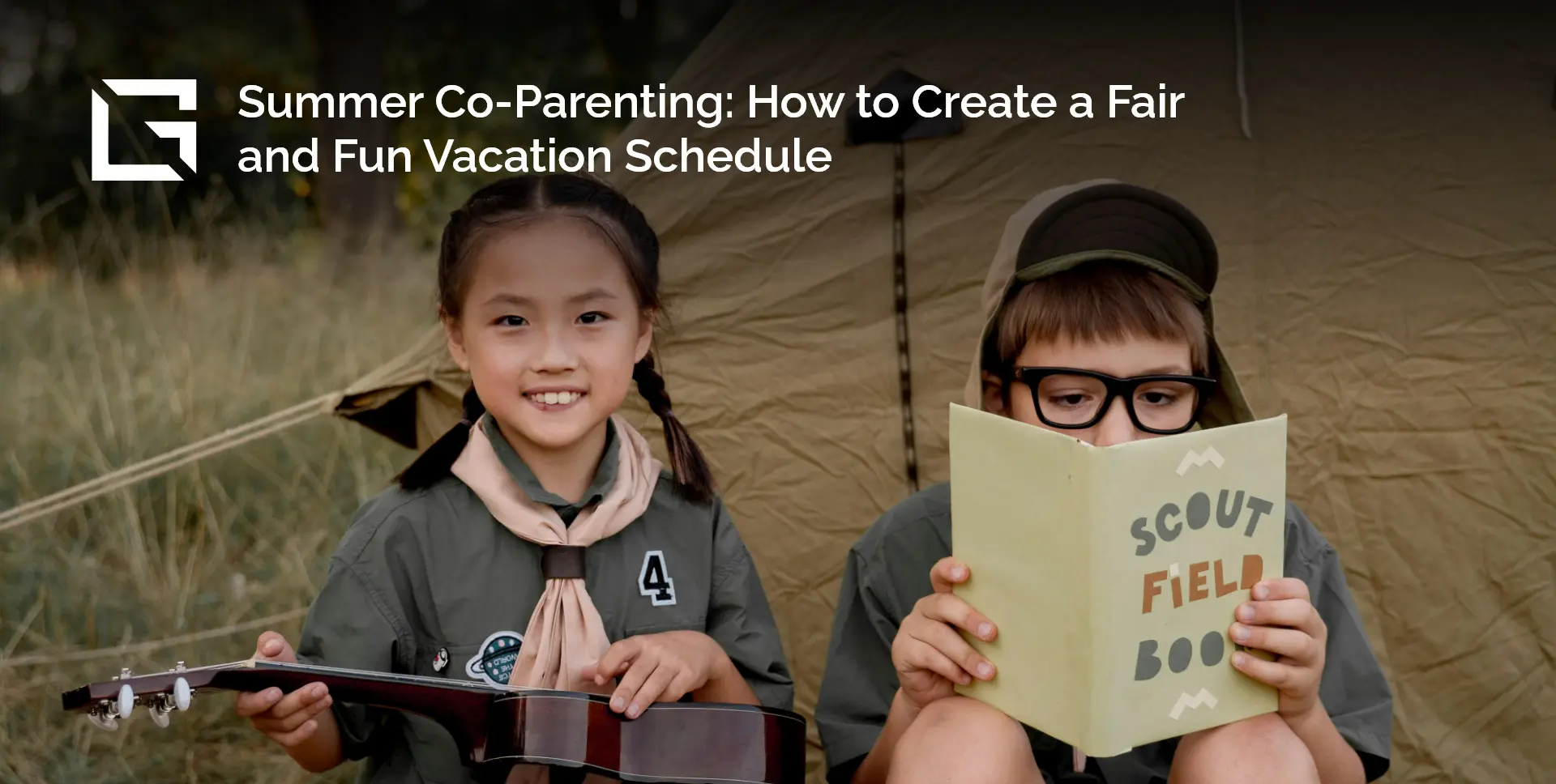When school lets out and the weather warms up, most families dream about vacations, lazy mornings, and trips to the pool. But for divorced or separated parents, summer can bring something else entirely: conflict, confusion, and last-minute scrambles over who gets which week with the kids.
At Gibb Law Firm, we hear it every year—parents struggling to navigate co-parenting logistics during the summer months. Maybe your custody agreement wasn’t written with a realistic summer plan in mind. Maybe your child wants to attend a sleepaway camp, but it overlaps with the other parent’s time. Or maybe someone wants to take a big out-of-state trip, and there’s disagreement about whether it’s fair.
Whatever the situation, there’s one truth we’ve seen hold steady: Summer doesn’t have to be a battleground. With some early planning, open communication, and a good understanding of your legal rights and responsibilities, summer can become what it’s meant to be—a season of fun, freedom, and family connection.
Let’s walk through the emotional and legal steps that can make co-parenting during summer a smoother experience for everyone involved, especially your child.
Start With a Conversation, Not a Conflict
It may seem obvious, but it’s worth repeating: the first step to a successful summer co-parenting schedule is communication. That doesn’t mean texting your ex a week before the Fourth of July to claim a weekend trip. It means sitting down—or setting up a structured email exchange—early in the year to plan summer around each parent’s vacation time, the children’s interests, and the framework of your current parenting plan.
Here’s what good summer co-parenting conversations should include:
- Proposed travel dates and destinations. Be specific. If you want to take the kids to Yellowstone from July 10–17, say so.
- Camps, enrichment programs, and family events. If Grandma’s 80th birthday bash or a science camp is already on the calendar, include those, too.
- Transportation logistics. Who will do the pickup? What happens if a flight is delayed?
- Contact expectations. Can the other parent check in during a long trip? Will there be scheduled calls?
These may seem like minor details, but clarity now prevents tension later. And remember—while some plans may need to change, having a shared starting point ensures you’re both working from the same playbook.
Don’t Skip the Legal Fine Print
Now that you’ve started the conversation, let’s talk about where the law comes in. Parenting plans often contain “vacation clauses” or summer parenting time provisions that override the regular custody schedule. These clauses might allow each parent a set number of uninterrupted vacation days, require advance notice, or define specific summer holidays (like Memorial Day or Labor Day) to be alternated each year.
Start by reviewing your current custody order and parenting plan. Pay attention to:
- Vacation allocation: Does each parent get two weeks in the summer? Is it consecutive or split?
- Notice requirements: Does the parenting plan require a written notice 30 or 60 days before taking vacation time?
- Priority rules: If both parents want the same week and can’t agree, who gets preference?
- Geographic restrictions: Can you take the kids out of state or out of the country?
If your plan doesn’t specifically address summer or if the existing language no longer works with your child’s age or interests, it may be time to request a modification. Courts typically support modifications that reflect the child’s best interest and maintain stability, especially when both parents agree.
In Utah, for example, either parent can petition to modify the parenting plan if there’s a substantial change in circumstances or if the current schedule is no longer practical. Camps, extracurriculars, or changes in a parent’s work schedule could all be valid reasons.
And remember: any deviation from the parenting plan should be in writing. Whether it’s a temporary change or a long-term adjustment, document the details by email or within a shared parenting app like OurFamilyWizard or Talking Parents. It’s not about mistrust—it’s about preventing misunderstandings and protecting everyone.
Prioritize the Child’s Experience, Not Parental Fairness
It’s tempting to think of summer as a time to “get your fair share.” But successful co-parenting—especially during vacation season—isn’t about keeping score. It’s about giving your child a season filled with connection, fun, and minimal stress.
So instead of starting with what’s convenient for you, start with what’s best for them.
Here are five ways to keep summer kid-focused:
- Involve older children in planning. While final decisions rest with the parents, teenagers especially benefit from having a voice in the summer calendar. Maybe they want to attend a friend’s birthday party or audition for a summer play. Listen to those preferences.
- Set realistic expectations. Travel is great, but don’t overload your child’s summer with back-to-back trips. Leave space for rest and routine, especially for younger kids who thrive on predictability.
- Create a shared calendar. Use a cloud-based calendar that both parents (and older kids) can view. This avoids confusion and shows respect for everyone’s time.
- Stay flexible. Flight delays, illnesses, or last-minute opportunities happen. When they do, respond with grace and flexibility, not resentment.
- Support the child’s relationship with both parents. Encourage communication while they’re away from you. A simple “Have fun with Dad!” goes a long way in making a child feel emotionally safe.
When children feel like both parents are on the same team, they experience less anxiety and more joy. And isn’t that what summer’s all about?
Conflict Happens. Here’s How to Handle It.
Even with the best planning, co-parenting conflicts sometimes arise. Maybe your co-parent wants to switch weeks, but you’ve already booked plane tickets. Or maybe one parent is routinely late to drop-offs, throwing the whole schedule off.
Here’s how to manage summer co-parenting disputes in a healthy, legally sound way:
- Don’t retaliate. Avoid making rash decisions like canceling their parenting time in response to a late arrival or missed pickup.
- Keep communication civil and focused. Use neutral language. Avoid blame. Stick to facts and solutions.
- Document everything. If the disagreement affects custody or visitation, keep a written record of what happened and when.
- Loop in your attorney when necessary. If repeated issues arise or if you suspect your parenting plan is being violated, we can help you navigate enforcement options or mediation.
Often, a neutral third party (like a mediator) can help resolve issues without going back to court. And if a court is necessary, your documentation will show that you acted reasonably and in good faith.
Let’s Talk About Modifying Your Summer Schedule
Maybe your child is older now and wants more time with one parent. Maybe someone moved, making handoffs harder. Maybe your current plan doesn’t account for out-of-state travel, but Grandma’s beach house is calling.
If your current schedule doesn’t serve your child’s evolving needs—or your family’s reality—it’s time to talk about a modification.
At Gibb Law Firm, we guide parents through the modification process with compassion and clarity. That includes:
- Evaluating whether your situation qualifies as a material change in circumstances under Utah law.
- Filing the proper legal paperwork to request a change.
- Negotiating a revised agreement that centers on your child’s best interest.
- Helping enforce existing orders if a co-parent isn’t cooperating.
You don’t have to go it alone—and you shouldn’t wait until summer chaos is in full swing.
Final Thoughts: Summer Shouldn’t Feel Like a Legal Minefield
Summer should feel like a season of possibility, not paperwork and parenting drama. And with a thoughtful approach, it can be.
Start with communication. Review your parenting plan. Put changes in writing. Focus on your child’s experience. And when conflict arises, handle it with calm, clarity, and if needed, legal support.
At Gibb Law Firm, we understand that your family’s peace matters. We help Utah parents build co-parenting strategies that are legally sound and emotionally sustainable. If you’re unsure how to navigate your summer schedule—or need help modifying a custody plan—we’re here to help.
Let’s make this summer one your kids will remember for the right reasons.
Need Help Adjusting Your Summer Custody Plan?
Gibb Law Firm offers personalized family law support for parents navigating custody, parenting time, and modifications in Utah. If you’re looking for legal guidance that puts your child first, schedule a consultation today.
Need Help with Custody Questions?
Gibb Law Firm serves families throughout Kaysville and surrounding Utah communities. Schedule a free consultation with us or call us directly at (801) 725-6035 today.
Disclaimer: This article is for informational purposes only and does not constitute legal advice. Please contact us to discuss the specifics of your situation.



